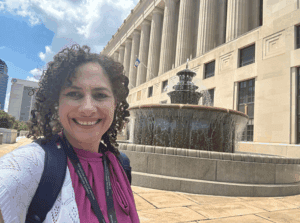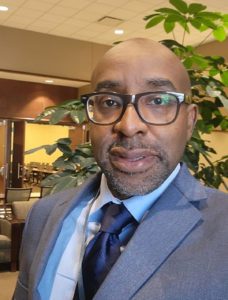New Certified Court Interpreters
By Barbara Derthick
We at TAPIT are happy to announce that several interpreters recently passed the TN Court certification exam in 2025.
Featured are a few of them who agreed to be interviewed. We are proud of all of your achievements and expect to hear great things about you in the future!

Waleska Rehbein, Certified Portuguese Court Interpreter
- Where are you from?
I’m originally from Porto Alegre, Brazil, and I’ve been living in Nashville, Tennessee, for about 15 years. - How did you learn English?
I started learning English as a child through school and language institutes in Brazil, and later earned a degree in Modern Languages and Literature, with a focus on English and Portuguese. After moving to the U.S., daily immersion and professional use of the language helped me refine my skills even further. - What led you to be an interpreter?
I’ve always loved bridging communication gaps. After years of teaching and translating, I realized that interpreting allowed me to use both languages dynamically, helping people truly understand and be understood in real time, which is incredibly rewarding. - How did you study? What do you think helped you pass the exam?
I prepared through consistent practice with mock hearings, terminology review, and interpreting drills. I used glossaries and listened to court recordings regularly. I recorded my renditions, reviewed and corrected myself, and repeated the process until I reached about 90% accuracy in the labs. I now have more than a thousand recordings on my phone! While doing housework or even driving, I would listen to my glossaries on Quizlet and interpret my practice labs out loud. I believe discipline, perseverance, and staying calm under pressure were key to my success. Ah! I had to take time to learn note-taking techniques which were a game changer for me. - What do you like to do when you are not working?
I enjoy spending time with my family, reading, cooking, and exploring new places around Tennessee, especially small towns and country roads. - Anything else about you that you would like to tell others?Even though the oral exam can be a hassle for many, for me it truly made me a better interpreter. I can honestly say that my work has improved significantly since I began preparing for the certification, the process itself sharpened my skills, discipline, and confidence in every assignment I take on. It’s a constant journey of learning and growth, and I’m grateful to be part of such a supportive professional community.
Outside of interpreting, I also teach Portuguese and love helping others learn to speak the language I cherish so much. You can learn more about my teaching work and read student feedback on my Wyzant Profile.

John Mark Maust, Certified Spanish Court Interpreter
- Where are you from?
That's a tricky question! I was born in Tegucigalpa, Honduras, and I spent my adolescence in Riobamba, Ecuador. I also went to college in New Orleans and lived there for eleven years, but since 2017, I have called Jackson, Tennessee home. - How did you learn Spanish?
I grew up bilingual. My parents are from the US, so we spoke English at home, and my education was primarily in English. However, living in Honduras, Costa Rica, and Ecuador meant that we spoke Spanish everywhere else. Then in college I got a minor in Spanish and then a MA in Romance Languages, which polished up my language skills. The Spanish I spoke with my buddies in Ecuador wasn't always exactly professional. - What led you to be an interpreter?
I actually have wanted to be an interpreter/translator since high school. I used to be a volunteer interpreter for groups that would come from the US to do various service projects in Ecuador. Then when I saw the 2005 film The Interpreter, I was sold. When I got my BA in International Studies and then my MA in Romance Languages, my dream was to get a job for the US Department of State or something similar. I ended up spending about a decade teaching college Spanish instead, but I think that experience also was good for where I am today. - How did you study? What do you think helped you pass the exam?
I became a registered interpreter in 2023, and since then I have done a little bit of everything. I completed a Master's Degree in Translation, and also used the ACEBO materials. Another thing I've been doing is intentionally listening to Spanish-language true crime podcasts and watching TV shows produced in Spanish-speaking countries that cover themes likely to come up in criminal cases. And I've also worked a lot! I think the more you interpret, the better you get. - What do you like to do when you are not working?
When not working, I love being in nature. I spend a lot of time hiking and camping; I try to go camping at least once a month. Over the past several years I've gotten into nature photography, and I find that spending time capturing the beauty I find in nature is very rewarding. When I'm not able to be in the wilderness, I love to cook or read at home. - Anything else about you that you would like to tell others?
Our profession gives everyone a voice. These exams are hard, because the standard we must hold ourselves to is high. Let's keep grinding and levelling up, those who speak through us deserve that.

Alfredo Bullen, Certified Spanish Court Interpreter
- Where are you from?
I am from Panama City, Republic of Panama. - How did you learn English/Spanish?
I belong to a family of Jamaican/Barbadian immigrants that came to Panama to build the Canal in the early 1900s. The English language was always around me through my parents, grandparents, our west Indian church and extended family. Additionally I’ve always been attracted to language and culture and I was also a very proficient in Spanish and English classes throughout elementary, high school and university. (My school was founded by west Indians). My country is heavily influenced by American culture to the point that regionally we are considered the “Miami” of Latinamerica. Our currency is the dollar. - What led you to be an interpreter?
I learned about the medical interpreter career a few weeks after being laid off a factory job due to the pandemic. Fortunately I was able to get certified as a medical interpreter and work for one of the largest hospitals in the state for 3 years. While working in the hospital, one of my colleagues mentioned in passing something about “legal interpreters”. I thought it was rather interesting that nobody seemed interested in pursuing the career alleging it was “gruesome” and “impersonal” but I was rather curious about it, not only because of the potential of a larger income but also because of the challenge and privilege of helping attorneys, judges, plaintiffs, etc to communicate. To me it felt like the natural next step. - How did you study? What do you think helped you pass the exam?
At first I did of lot of vocabulary work, listening and taking notes of how different colleagues phrased and interpreted different legal concepts. Doing so truly helps you find better or more efficient ways or options to interpret. Every interpreter has words or phrases, that for one reason or another, he or she finds easier to evoke from memory and verbalize rapidly. I also mimicked MANY note taking techniques from a very dear friend of mine who is a liaison to several counties in our state. I still remember observing her with awe and fascination as she took notes during a high stakes hearing. Needless to say, I was still VERY green back then.
I also focused on short memory exercises such as shadowing political or news shows and repeating in the same language what the host or guest was saying. The challenge of this exercise was progressively work on my décalage. In my personal opinion working on décalage works not only for simultaneous mode of interpretation but also in consecutive. The more you’re able to hold in your memory while focusing on what’s coming next, greatly helps in the quality and quantity of notes one takes. That has worked for me. Needless to say, Mrs. Mikkelson’s books and also Mrs. Virginia Valencia’s YouTube videos and books/workbooks were absolute game changers. Ultimately what helped me pass the certification oral test was persistence, realizing the perfection is not necessary given the incredible difficulty of the test and not hyper-focusing on past errors. One needs not let one mistake derail the rest of the test. Recording myself during practices was also pivotal but even better is practicing with other interpreters. Unfortunately this is a very isolated career so one may not have that opportunity. - What do you like to do when you are not working?
Reading, listening to podcasts, watch sports and spend time with family. - Anything else about you that you would like to tell others?
I’m doing a BA in Political Science. I hope to one day go to Law School and become a Federally Certified Spanish Interpreter as well.
